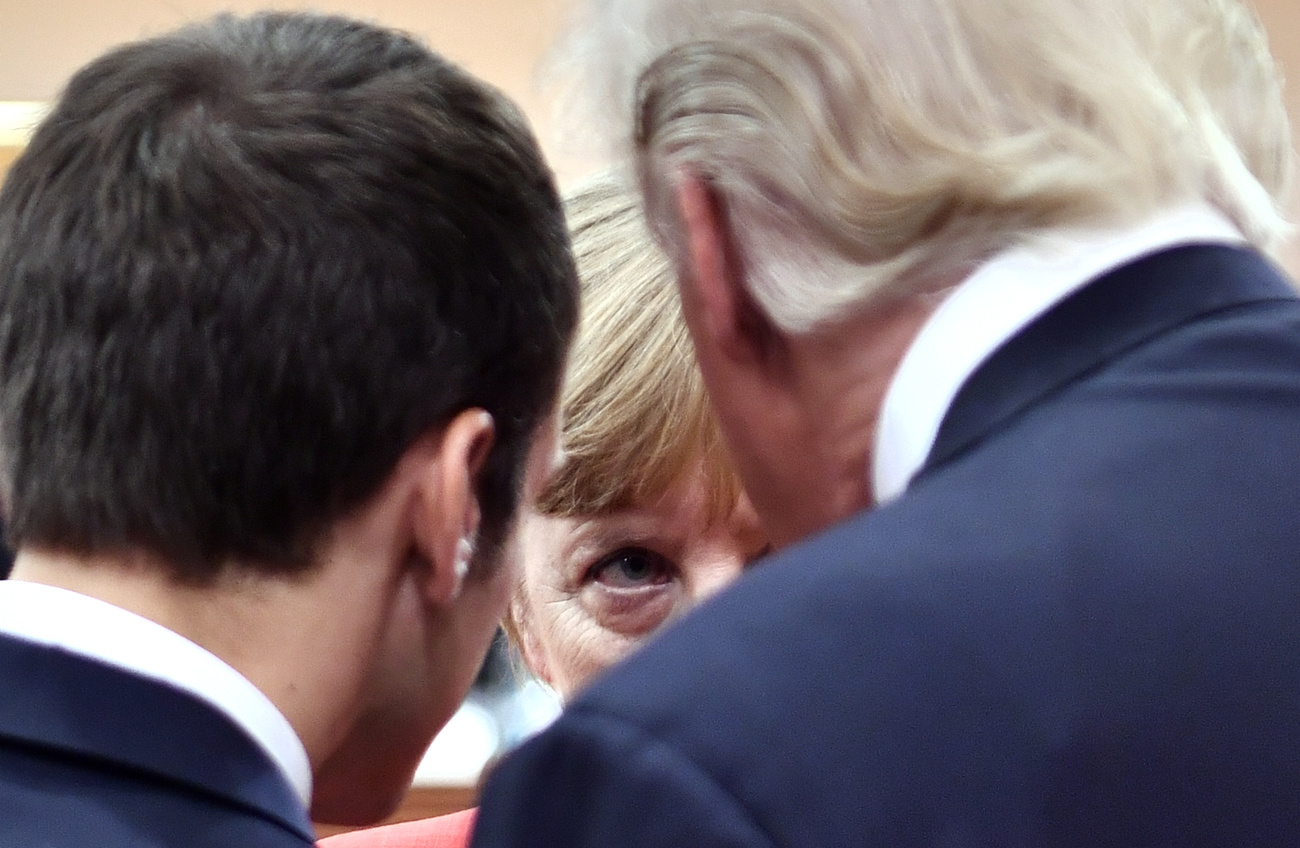
Complex personalities: world leaders Emmanuel Macron, Angela Merkel, and Donald Trump at a summit in 2017.
John MacDougall / Keystone
Leaders showing signs of narcissism or ruthlessness are backed by voters with more extreme views, a study involving the University of Lausanne finds.
In recent years, the rise of political characters like US President Donald Trump or Argentina’s chainsaw-wielding Javier Milei has left many scrambling to understand the role of personality and image in world affairs. In the case of Trump – who has said “I run the country and the world” – is he driven by pure ego? Is he operating according to a strategic “madman theoryExternal link”?
And as democracies – not just in the US – become more polarised, the question is how much leaders can play into societal divisions more largely. Online echo chambers and one-sided media play a role in driving groups apart; economic problems can also create animosity. But how much are individual politicians – and their personalities – responsible for turning people against each other?
‘In-house effect’
A studyExternal link by researchers in Switzerland and the Netherlands finds a certain link. In an analysis of 40 elections worldwide from 2016-2021, the results show that politicians with “dark personality traits” – narcissism, Machiavellianism and psychopathy – tended to be backed by voters with higher levels of “affective polarisation”, or emotional aversion to people who don’t share their views.
According to the study, which looked at 91 top politicians including Trump, Narendra Modi, Emmanuel Macron and Angela Merkel, the personality-polarisation link is not found across the board. Rather, it finds a significant “in-house effect”: the association was seen only for voters who already identified closely with the ideology of the politician in question. Voters who didn’t support their ideas so much in the first place were not triggered.
The study thus backs up previous findings that “politicians, often populists, with a dark, divisive and uncompromising personality […] tend to be disliked by the public at large, while at the same time being rather popular among more aggressive voters”.
Meanwhile the effect is not confined to one side of the political spectrum; neither dark personalities nor polarisation are exclusively left- or right-wing phenomena. However, the researchers write, “dark traits seem to be particularly prevalent among autocrats and populists, suggesting a potentially nefarious intersection between uncompromising leaders, democratic deconsolidation, and affective polarisation”.
How in-group versus out-group animosities affect Americans everywhere, including in Switzerland:
More

More
Trump, Biden and hatred: how US polarisation affects Americans in Switzerland
Supply and demand
Frederico Ferreira da Silva, who co-authored the March 2025 paper during his time at the University of Lausanne, says the results don’t show the exact mechanism through which politicians’ personalities influence the stance of their hardcore supporters. “The study shows an association, but it is unable to identify the cause,” he says.
As such, the research can’t solve the question of whether affective polarisation is a supply-side issue (“elites driving the masses”) or a demand side (“filling a market gap”) one, Ferreira da Silva adds. Overall, he thinks the dynamic is more top-down than bottom-up. But there are elements of both.

Frederico Ferreira da Silva is currently a research fellow at the University of Lisbon. He holds a PhD from the European University Institute in Florence, Italy, and previously worked at the University of Lausanne.
Courtesy
“Recent elections around the world show an increasing number of politicians who can be said to score high on these dark triad traits,” he adds. And they are clearly in demand – “a dark personality has even become an electoral asset”.
Problems for democracy
At the same time, research often talks about how voters take “cues” from their preferred candidates. This can mean being influenced ideologically or – as in this case – emotionally. This can then have a direct impact on democracy, especially since “many indicators tend to show that the most polarised people are also the most supportive of the erosion of democratic norms”, Ferreira da Silva says.
This “affective” impact comes on top of the more direct actions of certain politicians who have chosen autocratic paths in recent years. Indeed, when it comes to democratic decline, experts similarly argue about supply-side versus demand-side causes, with some keen to stress that economic or societal problems don’t explain everything, and that “leaders still matter”.
“Understanding why and how such leaders decided to push against democratic constraints on their power once in office – and why those constraints failed to contain them – should be at the heart of understanding the dispiriting spread of democratic backsliding around the world, in strong and weak economic performers alike,” Thomas Carothers and Brendan Hartnett recently wroteExternal link in the Journal of Democracy.
‘Void of ideas’
For his part, Ferreira da Silva says the rise of “dark” personalities is symptomatic of a bigger problem – a “void of political ideas or projects in contemporary societies”. A lack of substance leads to a politics which is more focused on personality, and to debates which are more aimed at “bringing the other side down”, he says.
He also hasn’t got a quick proposal to change things. There’s not much that can be done to influence the type of people standing for office, he stresses: given the current success of such figures, parties have little incentive to field more moderate candidates.
But he mentions media as particularly important, given that much of what feeds affective polarisation is a communication issue. “The US in particular has a big problem with partisan media,” he says. In Europe, where things are not so radicalised, it’s “largely because the media remains generally independent”.
Meanwhile in Switzerland, which was not included in the study, Ferreira da Silva says affective polarisation is very much directed towards political parties as abstract collective identities, rather than directly towards individual politicians – which would suggest that it would be somewhat less impacted by the phenomenon of divisive leaders driving polarisation.
While affective polarisation in Switzerland is not judged to be as severe as elsewhere, divisions and tensions exist:
More

More
Political rifts are less deep in Switzerland than elsewhere
More

More
Study reveals antipathy towards marginalised groups in Switzerland
Edited by Benjamin von Wyl/ts




